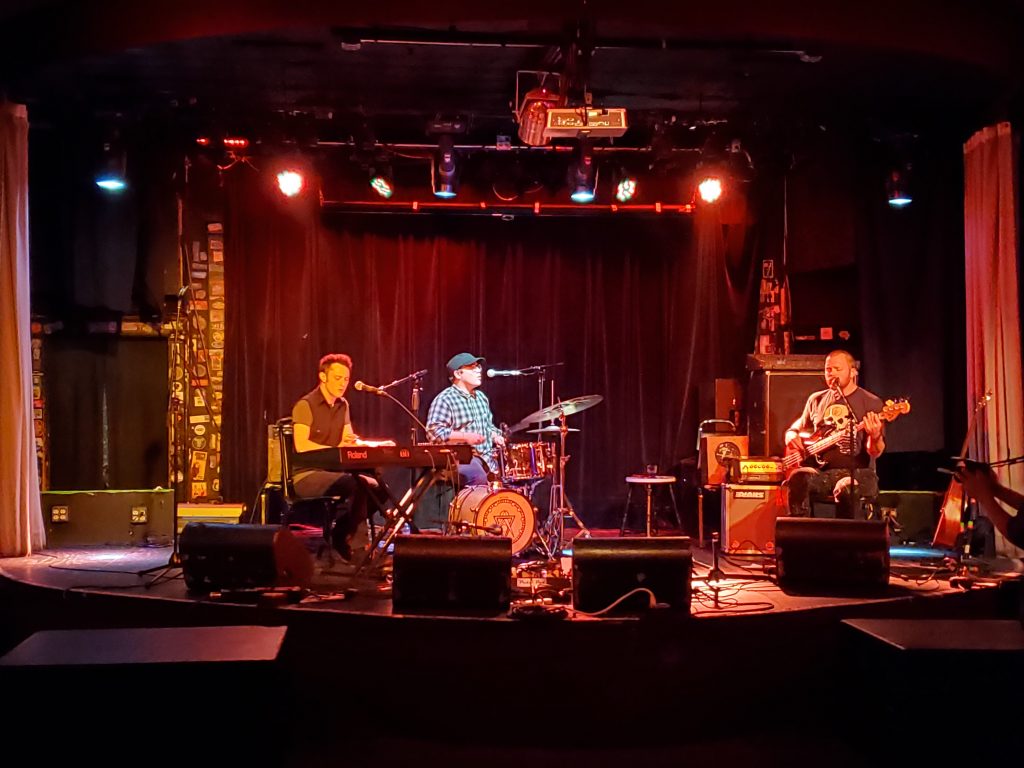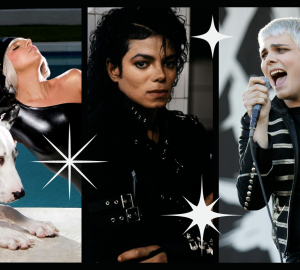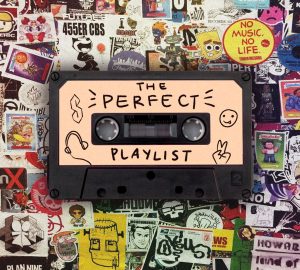by Alexander B. Leben
8:15 p.m.
I walked into the upstairs of Smith’s Olde Bar. Grand, the opening act, is already playing. “Is this a soundcheck?” was my first thought, followed by “How on Earth is this name free for the taking?” The room was basically empty with one photographer, two couples, one bartender, one other woman cooling in the back and us — two SCAD artisans.
I was perplexed as to why the show even started.

Grand is built on what Three Dog Night called “An Old Fashioned Love Song.” I’m sure they were singing about love at some point, if not all night like rock ‘n roll tends to. For this show, they played acoustically stripped down version of their songs. Even through this, they kept their structural integrity, their “three part harmony.” The woman in front of us at one point proclaimed, “They are so good.” This is virtually inarguable, since they exist on an amalgamation of classic tropes of pop music. They have talent, but never seemed to diverge from classic structure. They never presented anything that veered from classic tone. This woman’s point remains true, since these elements are what makes good music.
My biggest qualm with them was when they made it a point to announce they were playing a song different to how it was recorded. To me, announcing this detracts from the building of any real fanbase. In order to really love a song, you have to know how it goes — that’s how it works.
Afterwards, there was a reasonable break between acts to clear the stage or for people to arrive. When I played, breaks meant it was time to fuel up as hard and fast as possible, whether that meant shotgunning drinks or yelling the vowels as loud and as low as humanly possible — but perhaps that’s just me. At Smith’s, it was a lovely curtain being drawn and time allotted for people much more familiar with Parker Gispet’s work to arrive. When the curtain was drawn, he felt larger than life.
A simple search will present The Whigs as a rock band from Athens, Ga. This is radical. I was unaware of the presence these musicians cultivated, save perhaps seeing their name on flyers long ago. Gispert, guitarist and vocalist of The Whigs, stepped out of their spotlight to go out on his own last November. He mentioned this during his set, talking about how incredible it was to be back at Smith’s, since it is where his full-length album was released and where he began his first solo tour.
If I had to describe Gispert’s sound in one word, it would be “fuzz.” Heavy distortion reigned supreme throughout a set that touched on emotionally charged songs. I was informed his opening song was about underage sex, which I can only believe to be an emotional rollercoaster. This song and the ones that followed carried a familiar sentiment and gave off a similar vibe that one might receive when enjoying Long Island’s rock outfit Brand New. Save one huge identifier — fuzz.
Gispert played to a room that could have held four or five times the people present, but the sound was never adjusted to handle the lack of bodies. Instead, Gispert’s songs played larger and fuzzier than they might actually be. This is not his fault, but it does alter the experience of the music. Tuning, distortion, volume, even the ferocity of actually playing, all configure into the overall sound. If the set-up is crafted for a room of 1,000, there is going to be a heavy difference in how it is presented. The dissonance of reverb and other vibrations tends to drop off when there are more bodies to absorb the sound. The downside of this is experiencing songs at higher volumes than necessary, which in turn creates a bit more distortion to the already distorted.
He played with a tenacity that felt honest. I remarked at one point, “His songs are the perfect length.” He never strayed from his point long enough to create boredom, as some musicians tend to do. Instead of droning on and on and on and on, Gispert’s crafted anthems landed perfectly. He always held a smile, which brought his messages closer to the heart; his strumming felt humanized. He became more relatable to the crowd, whether it was with jokes or with simple anecdotes, his humanity fueled our appreciation. It was more like we were all friends on the same journey, far from a rockstar filling time with necessary parts to the act.
When the curtains were drawn and I saw him for the first time, I judged him on his choice of leopard print suit. Gispert, like any good artist, often changed throughout the performance. I was swayed from the perch of uptight snobbery. His presence was gold. Gispert’s jovial attitude brought a clear understanding of his past, his goals and his person. Any snap judgements were lost. Unfortunately, there was much more left to judge: the fuzz.
When heavier distortion was applied to “Welcome to My Public Meltdown,” it interfered with the sentiments sung about. Gispert’s more emotional song included a great anecdote about farm life, and he brought the audience into his mindset when writing and playing it wonderfully. When he hit the extended distortion, his voice became a nuisance. Listening to the sonic assault begged a deeper question: Why am I hearing his picking? Was it because of the lack of bodies to absorb the sound? Or was it the amplification’s set-up and execution? It is possible he was playing too close to his mics, but that shouldn’t allow for the constant crunch of the pick to come through. Was this intended? If it was, it added to the noticeable off-time rhythm that towered over a rather enjoyable set, with an interesting sound.
Gispert is definitely talented, with a persona all his own. Never once did his performance feel like an act or a front. Never once did his lyrics feel forced or ghostwritten. Never once was his music anything outside of genuine.
Gispert gave a wonderful performance that resonated with his audience. His merch table existed unmanned. No one dared to steal or slight the artist, which speaks volumes to both the crowd and the artist. Growing up attending hardcore, metal and punk shows, a merch table without a person meant there were eyes somewhere. Gispert’s felt free, appreciated on a higher level. He mentioned having been in The Whigs, but he didn’t harp on it. He wasn’t looking for any freely awarded respect because of his achievements, he was living in the moment of his current project. His unguarded merch table speaks to this — he has trust in his fans and his fans have respect for him.
Overall, Parker Gispert is an artist to enjoy on a higher level of entertainment. He is not just here to entertain, but to connect and to relate. Gispert’s music may have been overly distorted with set-up meant for a larger crowd, but his messages and experiences transcend the open spaces. For a single artist, he delivered a sonic assault most three- and four-piece acts cannot deliver. Gispert found a way for his sound to resonate equally with the crowd that grew up knowing him as the guitarist of The Whigs and with a younger, more naïve crowd to his exploits. Parker Gispert is an artist worth investing time in and is one worth experiencing.























